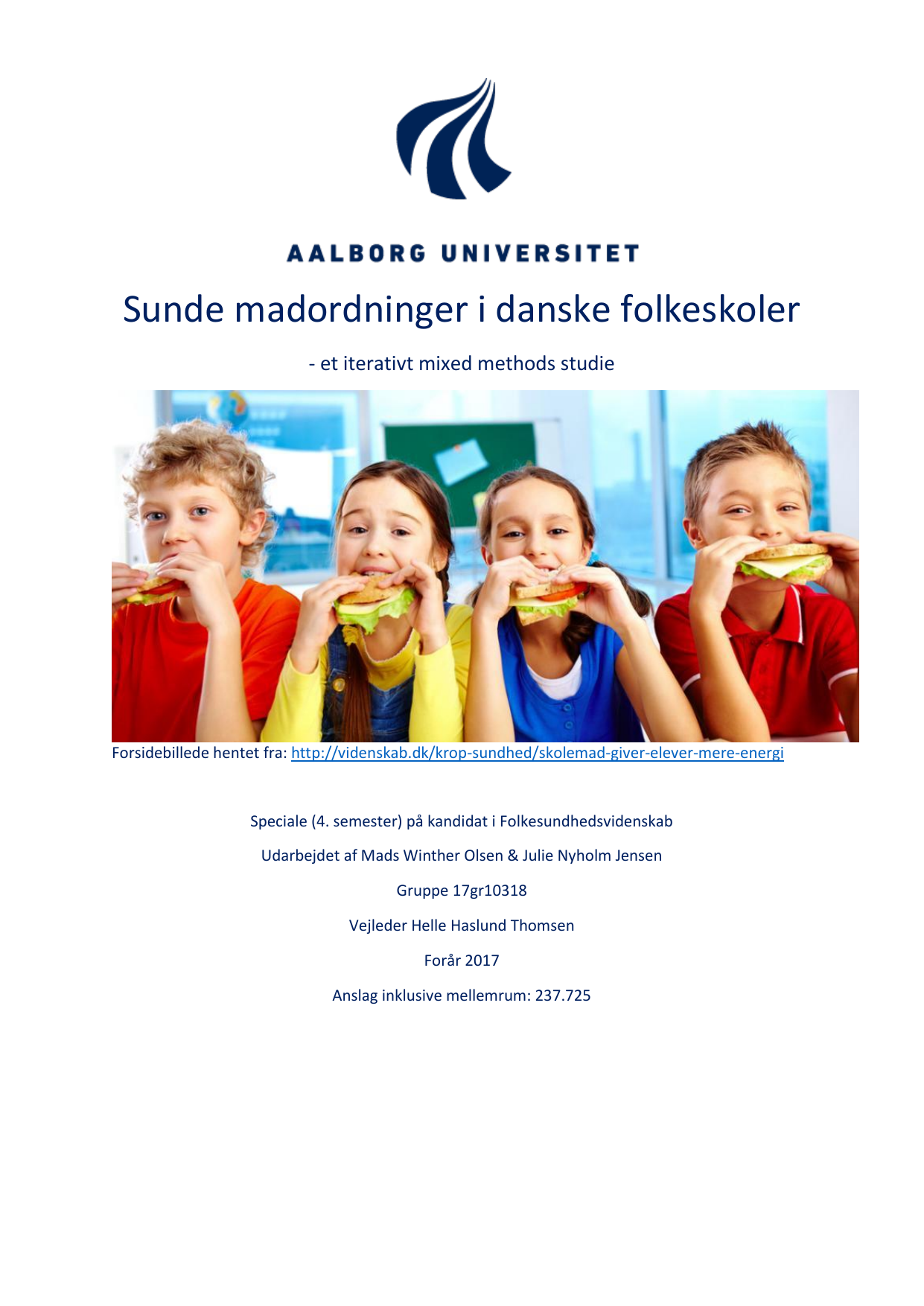
Sunde madordninger i danske folkeskoler - et iterativt mixed methods studie
Oversat titel
Healthy food programs in Danish municipal primary and lower secondary schools - an iterative mixed methods study
Forfattere
Semester
4. semester
Uddannelse
Udgivelsesår
2017
Afleveret
2017-06-05
Antal sider
354
Abstract
Introduktion En stor andel af de danske skolebørn har et uhensigtsmæssigt kostmønster, hvilket kan have konsekvenser på kort sigt, såvel som på lang sigt. Efter skolereformen i 2014 bruger børnene op til otte timer om dagen på skolen, og derfor er det relevant at anskue den ernæring, de indtager i denne kontekst. Skolemadsordninger er en mulighed for at påvirke den mad børnene indtager, og der er god evidens for, at morgenmadsordninger er gavnlige for skolebørnene. Der er dog et videnshul i relation til frokostordninger og i den helt specifikke lokale kontekst mangler Skoleforvaltningen i Aalborg Kommune viden om, hvordan skolerne håndterer ernæringen. Formål Formålet med dette speciale er at bidrage med viden om implementering og forandring af skolemadsordninger på folkeskoler, både fra international og lokal kontekst, og yderligere give en viden om, hvordan de 50 skoler i Aalborg Kommune tilbyder forskellig skolemad. Dette vil skabe grundlag for et forandringsforslag, som både hjælper skolerne, eleverne og samfundet med at øge folkesundheden. Metoder Specialets design er et iterativt mixed methods, der inkluderer et litteraturstudie, en spørgeskemaundersøgelse og observationer. I spørgeskemaundersøgelsen anlægges en positivistisk tilgang, hvor alle 50 skoler inviteres til at deltage via telefoninterview. 42 skoler svarer, hvilket giver en svarprocent på 84 %. Selve spørgeskemaet udarbejdes ud fra fund i litteraturstudiet. I observationerne arbejdes der ud fra en socialkonstruktivistisk tilgang, hvor to skoler er udvalgt til at deltage ud fra informationer fra spørgeskemaet. Hver skole observeres tre gange, og hele forløbet varer 14 dage. Skolernes spiseområde, salgsområde og køkken observeres, og fundene analyseres ud fra John Deweys Pragmatisme. Slutteligt samles disse fund og vurderes ud fra implementeringsmodellen Active Implementation Frameworks. Resultater 73,8 % af skolerne i Aalborg Kommune har en madordning, hvor de største skoler oftere har en madordning end de mindre. Af barrierer for at implementere en madordning findes skolens økonomi, tidsforbrug, lille størrelse, manglende adgang til personale og udstyr, samt at ernæringspolitikken er for restriktiv. Af fremmende faktorer findes engagement hos ledelsen, et godt forhold mellem kantinepersonale og elever samt høj grad af elevinddragelse. Konklusion Specialets konklusion er en række anbefalinger for udviklingen af en sund skolemadsordning. Anbefalingerne består af fire faser med konkrete og evidensbaserede forslag, som skolerne kan følge.
Introduction A substantial proportion of Danish school children have an inexpedient diet, which can have short- and long-term consequences. After the Danish school reform in 2014 the children spend up to eight hours a day in school, which is why it is relevant to explore the nutrition they consume in this context. School food programs are an opportunity to influence the food the children consume and there is solid evidence that breakfast programs are beneficial for school children. However, there is a knowledge gap in relation to lunch programs and in the specific local context, the school administration in the municipality of Aalborg lacks knowledge of how the different schools handle nutrition. Purpose The purpose of this thesis is to contribute with knowledge about implementation and modification of school food programs in municipal primary and lower secondary school as well as knowledge of how the 50 schools in the municipality of Aalborg offers different food choices for the children. This will create a basis for a change proposal that helps schools, students and society to increase the public health. Methods The design of this thesis is an iterative mixed method, which includes a study of the literature, a questionnaire and observations. The questionnaire applies a positivistic approach, where all 50 schools are invited to participate via phone interview. 42 schools responded giving a response rate of 84 %. The questionnaire is based on findings in the study of the literature. The observations are based on a social constructivist approach, where two schools are selected to participate based on information from the questionnaire. Each school is observed three times and the whole course of observations last 14 days. The schools´ dining area, sales area and kitchen are observed and the findings are analysed using John Dewey´s Pragmatism. Finally, these findings are compiled and assessed using the Active Implementation Frameworks model. Results 73,8 % of the schools in the municipality of Aalborg have a school food program, with the largest schools more often having a program than the smaller ones. Barriers to implementing a food program include the school´s economy, time spent on the program, small school size, lack of access to staff and equipment, and nutritional policies that are too restrictive. Facilitating factors include commitment from the management, a good relationship between canteen staff and students as well as a high degree of student involvement. Conclusion The conclusion of this thesis is a series of recommendations for the development of a healthy school food program. The recommendations consist of four phases with specific and evidence based suggestions that schools can follow.
Emneord
